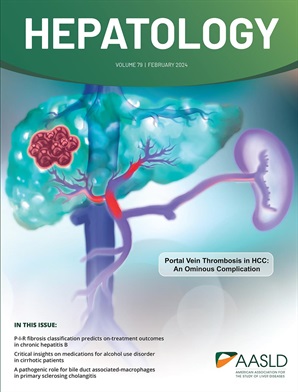Short-term starvation boosts anti-PD-L1 therapy by reshaping tumor-associated macrophages in hepatocellular carcinoma
IF 12.9
1区 医学
Q1 GASTROENTEROLOGY & HEPATOLOGY
引用次数: 0
Abstract
Background and Aims: Immune checkpoint inhibitors (ICIs) have revolutionized systemic hepatocellular carcinoma (HCC) treatment. Nevertheless, numerous patients are refractory to ICIs therapy. It is currently unknown whether diet therapies such as short-term starvation (STS) combined with ICIs can be used to treat HCC. This study aimed to investigate whether STS could sensitize HCC tumors to immunotherapy. Approach and Results: STS was found to attenuate tumor progression by inducing tumor-associated macrophages (TAMs) to switch to an antitumoral phenotype, enhancing phagocytosis of tumor cells, and stimulating subsequent anti-tumor immunity of CD8求助全文
约1分钟内获得全文
求助全文
来源期刊

Hepatology
医学-胃肠肝病学
CiteScore
27.50
自引率
3.70%
发文量
609
审稿时长
1 months
期刊介绍:
HEPATOLOGY is recognized as the leading publication in the field of liver disease. It features original, peer-reviewed articles covering various aspects of liver structure, function, and disease. The journal's distinguished Editorial Board carefully selects the best articles each month, focusing on topics including immunology, chronic hepatitis, viral hepatitis, cirrhosis, genetic and metabolic liver diseases, liver cancer, and drug metabolism.
 求助内容:
求助内容: 应助结果提醒方式:
应助结果提醒方式:


